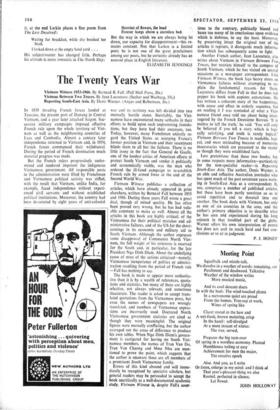The Twenty Years War
Vietnam Witness 1953-1966. By Bernard B. Fall. (Pall Mall Press, 50s.) Vietnam Between Two Truces. By Jean Lacouture. (Secker and Warburg, 35s;) Reporting South-East Asia. By Denis Warner. (Angus and Robertson, 36s.) IN 1858 invading French forces landed at Tourane, the present port of Danang in Central Vietnam, and a year later attacked Saigon. Suc- cessive military campaigns imposed. effective French rule upon the whole territory of Viet- nam as well as the neighbouring countries of Laos and Cambodia. Almost a century later independence returned to Vietnam and, in 1954, French forces commenced their withdrawal. During the period of French domination much material progress was made.
But the French rulers progressively under- mined and rendered impotent the indigenous Vietnamese government. All responsible posts in the administration were filled by Frenchmen and Vietnamese political activity was stifled, with the result that Vietnam, unlike India, for example, faced independence without experi- enced civil servants and without established political institutions. Moreover, the country had been devastated by eight years of anti-colonial
war and its territory was left divided into two mutually hostile states. Inevitably, the Viet- namese have encountered many setbacks in their efforts to build upon such unpromising founda- tions, but they have had their successes, too. Today, however, many Frenchmen unjustly re- gard the United States as usurping France's former position in Vietnam and their resentment blinds them to all but the failures. There is no little irony in the fact that General de Gaulle, one of the loudest critics of American efforts td protect South Vietnam and render it politically and economically viable, was the man Who ordered the ill-fated campaign to re-establish French rule by armed force at the end of the Second World War.
Vietnam Witness publishes a collection of articles, which have already appeared in print elsewhere, written by Bernard Fall between 1953 and 1966. During those years Fall wrote a great deal, though of mixed quality. He has often been proved very wrong, but he has had valu- able comment to make as well. Almost all the articles in this book are highly critical; of the Vietnamese for their political mistakes and ad: ministrative failures, and of the US for the short- comings in its economic and military aid to South Vietnam. Although the author expresses some disapproval of Communist North Viet- nam, the full weight of his strictures is reserved for the South and, in particular, for the late President Ngo Dinh Diem. About the underlying cause of most of the actions criticised—namely; Vietnamese inexperience of politics or adminis- tration resulting from the period of French rule —Fall has nothing to say.
The book is made to appear more authorita- tive than it is by a wealth of references, quota- tions and statistics, but many of these are highly selective, not always relevant, and sometimes inaccurate. The reader is asked to accept trans- lated quotations from the Vietnamese press, but even the names of newspapers are wrongly translated, and numbers of Vietnamese expres- sions are incorrectly used. Doctored North Vietnamese government statistics are cited as though they were meaningful. The original figures were mutually conflicting, but the author averaged out the areas of difference to produce his own tables. When Ngo Dinh Diem's govern- ment is castigated for having no South Viet- namese members, the names of Tran Van Do, Tran Van Chuong and Mme Nhu are men- tioned to prove the point, which suggests that the author is unaware these are all members of a prominent South Vietnamese family.
Errors of this kind abound and will imme- diately be recognised by specialist scholars, but general readers may be persuaded to accept the book uncritically as a well-documented academic study. Vietnam Witness is, despite Fall's asser- Lions to the contrary, politically biased and bases too many of its conclusions upon evidence which is dubious, to say the least. Moreover, by preserving intact the original text of the articles it reprints, it disregards much informa- tion which has subsequently come to light.
Another French author, lean Lacouture, also writes about Vietnam in Vietnam Between Two Truces, but restricts himself to the compass of South Vietnam, which he has visited on several occasions as a newspaper correspondent. Like Vietnam Witness, the book lays heavy stress on Vietnamese failures without attempting to ex- plain the fundamental reasons for them Lacouture differs from Fall in that he does not pepper his book with copious annotations. He has written a coherent story of the happenings, with cause and effect in orderly sequence, but on reading it I was reminded of what a Viet- namese friend once told me about being inter- rogated by the French Deuxieme Bureau. 'It is useless to tell the truth,' he said. 'You will only be believed if you tell a story which is logi- cally satisfying, and truth is rarely logical' Vietnam Between Two Truces is readable, logi- cal, and most misleading because of numerous inaccuracies which are presented to the reader as though they were established facts.
Less pretentious than these two books, but in some respects more informative—particularly for the non-specialist reader—is Reporting South-East Asia. The author, Denis Warner, is an able and reflective Australian journalist who has spent much of the past seventeen years work- ing in South-East Asia as a correspondent. It, too, comprises a number of published articles, but these have been partly rewritten so as to avoid repetition and to dovetail into one another. The book deals with Vietnam, but only as one of six countries in the area, and the author's primary objective is to describe what he has seen and experienced during his long sojourn in -that troubled part of the globe. Warner offers his own interpretation of events but does not seek to reach hard and fast con- clusions or to sit in judgment.
P. J. HONEY


































 Previous page
Previous page